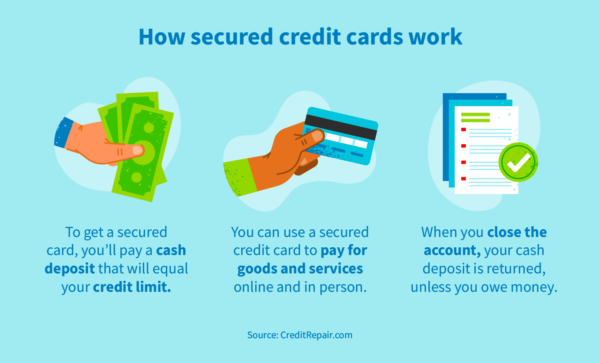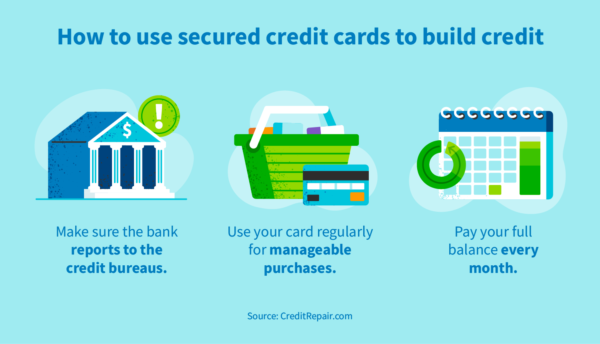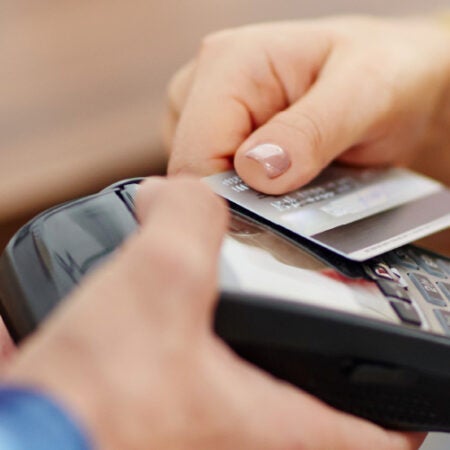
Disclosure regarding our editorial content standards.
Unlike regular credit cards, secured credit cards require a deposit to use. Typically the deposit you pay to use a secured credit card is equal to your credit limit, which means the lender takes on no risk—if you don’t pay your bill, they simply keep your deposit. On the other hand, regular credit cards are unsecured, meaning that the lender lets you borrow money without a deposit, expecting based on your credit history that you’ll pay them back later.
When you’re deciding between a secured and an unsecured credit card, it’s helpful to think about your own situation. If you’re just starting to build your credit or looking to rebuild your credit, a secured credit card could be a great option. On the other hand, unsecured credit cards typically provide higher credit limits and lower interest rates—some even provide rewards or cash back.
| Secured credit cards | Unsecured credit cards | |
|---|---|---|
| Cash deposit | Required | Not required |
| Credit limit | Lower. Usually equal to deposit | Higher, depending on credit score |
| Interest rates | Higher, often more than 20 percent | Lower, depending on credit score (14–20 percent) |
| Credit check | Often not required | Required. |
| Fees | Usually | Generally only for rewards cards |
| Helps to build credit | Yes, if the card issuer reports to credit bureaus | Yes |
Read on to learn how to distinguish secured vs. unsecured credit cards and how to choose the kind of credit card that’s well suited to your current credit situation.
How do secured credit cards work?
Secured credit cards work similarly to traditional (unsecured) credit cards, but they require a deposit to use. Before using a secured credit card, you’ll need to provide a cash deposit that the lender keeps to back the credit they extend to you.

Just like any other credit card, you can use a secured card to pay for goods and services both in person and online. Your credit limit—or the maximum amount you can charge to the card—is usually equal to the cash deposit you provided. A typical deposit for a secured credit card may be anywhere from several hundred to several thousand dollars.
Because you can’t spend more than you’ve already paid to the lender, these kinds of cards are considered low risk, so they’re often suggested to people without credit history or who need to rebuild their credit score.
You’ll want to be sure to pay your bill each month for a secured credit card. If you neglect to pay your bill for several months, the lender will use your deposit to pay off what you owe—and they may close your account as well.
Do secured credit cards help your credit?
Secured credit cards can help your credit, but you’ll need to keep a few things in mind:
- Make sure your lender reports to the credit bureaus. Three major credit bureaus—TransUnion®, Experian® and Equifax®—are responsible for tracking your credit history. If your lender doesn’t report your credit activity to at least one of the bureaus, it won’t help you build credit.
- Avoid getting behind on your payments. While a secured credit card is an excellent way to build your credit history, you’ll want to make sure it’s a positive history. Falling behind on your payments can negatively affect your credit score and potentially lead to interest charges.
- Understand how credit scores are calculated. A variety of factors—including credit utilization and length of credit history—are used to calculate your credit score. By understanding everything that goes into how your credit is calculated, you can make strong choices with a secured credit card.
Knowing that a secured credit card can help you build credit, it’s important to think about the advantages and disadvantages of these cards before applying to get one.
Pros and cons of secured credit cards
Secured credit cards can be a useful tool, but they have some disadvantages as well. Consider all of the following when deciding whether a secured card is the right choice for you:

Pros
- Provides the chance to build your credit if you have no credit history or poor credit
- Offers an opportunity to practice responsible credit usage, since the cash deposit enforces your credit limit
- Can be used like a regular credit card, offering freedom to pay at many merchants in person and online
Cons
- Could require monthly fees, which can be costly over time
- May have a low credit limit, so your card could be insufficient for your needs
- Often have high interest rates, which can get out of hand if you fall behind on payments
If you decide to get a secured credit card, you’ll likely want to upgrade to a regular credit card over time. After building your credit and learning how to manage your spending, a regular credit card offers advantages and flexibility.
How do unsecured credit cards work?
A credit card enables you to pay for goods and services with money that you borrow from a lender. The lender will record all of the transactions you make with the card, and each month it will issue you a bill—you’ll need to pay at least part of this amount, but you’ll avoid interest charges if you pay the balance in full. You’ll be able to borrow money up to a predetermined amount, which is your credit limit.
Here are a few things to keep in mind about unsecured credit cards:
- Lenders don’t want to lose money in the long-term, so credit cards are provided on the basis of credit scores. People with higher credit scores have demonstrated over time that they pay back their debts, so lenders are less worried about offering them additional credit. On the other hand, people with lower credit scores may have neglected to pay certain debts or don’t have a long credit history, which means lenders consider them to be a higher risk.
- The reason regular credit cards are called “unsecured” is that there is no deposit backing them. If you don’t pay your bill, the credit card company will likely send your debt to collections because they can’t simply access a deposit to pay off the balance like they could with a secured credit card.
- As you build your credit, you’re typically able to get access to better credit cards, which could include lower interest rates and higher credit limits—or other perks or rewards, like cash back or special discounts. Additionally, responsible use of a credit card can improve your credit score, which also opens the door to better options for loans, like car loans or mortgages.
When you’re considering applying for an unsecured credit card, consider the advantages and disadvantages.
Pros and cons of unsecured credit cards
Unsecured credit cards—often simply called credit cards—can be very useful, but there are a few drawbacks to consider as well.
Pros
- Typically provide higher credit limits, making them useful for both day-to-day and larger purchases
- May offer rewards and perks like cash back or special discounts
- Usually involve lower interest rates, which helps if you aren’t able to pay your monthly bill in full
Cons
- Can be difficult to apply for if you have no credit history or poor credit
- Could have annual fees to keep your account open
- Terms may change over time, so it’s important to monitor interest rates
Despite the drawbacks, unsecured credit cards are generally a solid option if you have the credit score to get one and the habits to use it responsibly.
Is it better to have a secured or unsecured credit card?
Since secured and unsecured credit cards both have distinct advantages and disadvantages, there is no single answer to which one is better. Instead, you’ll want to look at your needs and circumstances to decide which kind of card is best suited to you.
If you’re looking to build or rebuild your credit, or you want to learn responsible credit habits, a secured credit card may be the right choice. On the other hand, if you already have a solid credit history and you’re seeking higher spending limits or perks granted by a particular card, you’ll likely want to aim for an unsecured card.
No matter what kind of card you get, once you start using a credit card, you’ll want to get into the habit of regularly checking your credit report. Keep an eye out for any inaccurate information or fraudulent accounts.
As you build your credit score, these misleading negative items can be an unnecessary bump in the road. Fortunately, it is possible to repair your credit if you’ve noticed something incorrect on your report.





